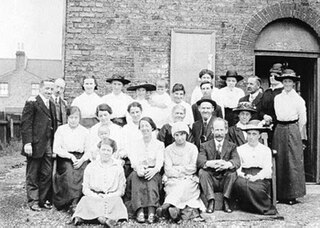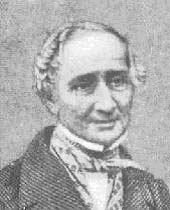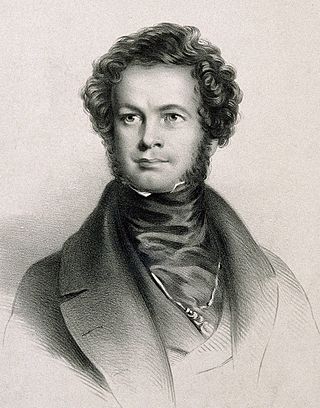Related Research Articles

John Nelson Darby was an Anglo-Irish Bible teacher, one of the influential figures among the original Plymouth Brethren and the founder of the Exclusive Brethren. He is considered to be the father of modern dispensationalism and futurism. Pre-tribulation rapture theology was popularized extensively in the 1830s by John Nelson Darby and the Plymouth Brethren, and further popularized in the United States in the early 20th century by the wide circulation of the Scofield Reference Bible.

The Plymouth Brethren or Assemblies of Brethren are a low church and Nonconformist Christian movement whose history can be traced back to Dublin, Ireland, in the mid to late 1820s, where it originated from Anglicanism. The group emphasizes sola scriptura, the belief that the Bible is the only authority for church doctrine and practice. Plymouth Brethren generally see themselves as a network of like-minded free churches, not as a Christian denomination.

The Exclusive Brethren are a subset of the Christian evangelical movement generally described as the Plymouth Brethren. They are distinguished from the Open Brethren from whom they separated in 1848.

Francis William Newman was an English classical scholar and moral philosopher, prolific miscellaneous writer and activist for vegetarianism and other causes.

The Indian Brethren are a Christian Evangelical premillennial religious movement. Although they have some distinct characteristics, they have a lot in common, in both doctrine and practice, with the international Open Brethren movement, with whom nearly all of them are historically affiliated.
Arthur Charles Gook in London, England is primarily known today for having translated Reverend Hallgrímur Pétursson's Passion Hymns into English.
Charles Thomas Pearce (1815–1883) M.D., M.R.C.S., F.R.S., was an English physician and early opponent of mandatory vaccination. A member of the Royal College of Surgeons, fellow of the Royal Society and a Freemason, Charles was a homoeopath and surgeon, with an interest in medical astrology, vegetarianism, improved care for the mentally ill and the cessation of vivisection.

Anthony Norris Groves was an English Protestant missionary, who has been called the "father of faith missions". He launched the first Protestant mission to Arabic-speaking Muslims, and settled in Baghdad, Ottoman Empire; and later in southern India. His ideas influenced a circle of friends who became leaders in the Plymouth Brethren. Among these were George Müller, who had married Groves's sister Mary, as well as John Nelson Darby and John Vesey Parnell, 2nd Baron Congleton.

William Kelly was a prominent Irish member of the Plymouth Brethren, amongst whom he was a prolific writer.
Arthur Rendle Short was a professor of surgery at Bristol University and author.
John Vesey Parnell, 2nd Baron Congleton was an aristocrat and Christian missionary.
Christian Devotedness is a small booklet written by Anthony Norris Groves.

Benjamin Wills Newton was an English evangelist, author of Christian books, and leader of a Plymouth church. His congregation and others around Plymouth became known as the Plymouth Brethren. Newton was a friend of John Nelson Darby, a well-known leader of the Plymouth Brethren, but the two men began to clash on matters of church doctrine and practice. This led to a 1848 split of the movement into the Open Brethren and Exclusive Brethren.
George Vicesimus Wigram was an English biblical scholar and theologian.

Frederick John William Lambart, 8th Earl of the County of Cavan was a British aristocrat. He was the son of George Frederick Augustus Lambart, Viscount Kilcoursie and Sarah Coppin.

Dr John Epps was an English physician, phrenologist and homeopath. He was also a political activist, known as a champion of radical causes on which he preached, lectured and wrote in periodicals.
John Gifford Bellett was an Irish Christian writer and theologian, and was influential in the beginning of the Plymouth Brethren movement.
John Franklin Gray was an American educator and physician, a pioneer in the field of homoeopathy and one of its first practitioners in the United States. He is also recognized as an important medical reformer.

Frederic Hervey Foster Quin was the first homeopathic physician in England.
The Open Brethren, sometimes called Christian Brethren, are a group of Evangelical Christian churches that arose in the late 1820s as part of the Assembly Movement within the Plymouth Brethren tradition. They originated in Ireland before spreading throughout the British Isles, and today they have an estimated 26,000 assemblies worldwide.
References
- ↑ See entry for Edward Cronin in the Calendar of the Grants of Probate and Letters of Administration for 1882.
- ↑ Mosley, C., ed., Burke's Peerage, Baronetage & Knightage, 107th edition Wilmington: Burke's Peerage (Genealogical Books) Ltd, 2003), volume 1, page 876
- ↑ Rowdon, H.H., The Origins of the Brethren, 1825-1850, Pickering & Inglis, 1967, p. 37
- ↑ Bradford, T.L., Pioneers of Homeopathy, 1898
- ↑ Epps, J., Homoeopathy and Its Principles Explained, English Homoeopathic Assn., 1850, p. 314
- ↑ Epps, J., Homoeopathy and Its Principles Explained, English Homoeopathic Assn., 1850, p. 231
- ↑ Mason, A.S., "Wasn't It Exciting!" A Compilation of the Work of A. Stuart Mason, p. 203, Royal College of Physicians, 2004, ISBN 1-86016-206-1
- ↑ Monthly Homeopathic Review, Vol. 26, p. 193.
- ↑ Rowdon, H.H., The Origins of the Brethren, 1825-1850, Pickering & Inglis, 1967, p. 37
- ↑ Neatby, William Blair (1901). A History of the Plymouth Brethren. London: Hodder and Stoughton. pp. 286–303. Retrieved 3 January 2016.
